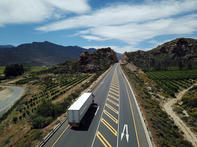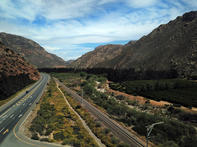First Fruit Exports
One of the earliest commercial fruit farming operations in South Africa, the Cape Orchard Company, was established in the Hex River Valley in 1892.

New technology, available infrastructure and a visionary pioneer named Leicester Maguire Dicey started international fruit exports from the valley and thus some of the earliest origins of an international industry worth billions today were founded on this site.
Cold storage ship transport was in its early stages of development and the first successful fruit exports to the UK were completed on the Drummond Castle in 1892.
The wine industry in the Western Cape had been severely affected by the Great Phelloxera epidemic that decimated wine vineyards around the globe and therefore this marketing breakthrough with fresh fruit created a great deal of excitement as a possible alternative to wine production.
Farmers in the Western Cape realised the possibility of producing fresh fruit in South Africa for export to the UK, where fruit sales during the UK winter held remarkable potential.
Orchards No More

The railway through the Hex River Valley had recently been completed in the 1870s and this presented the possibility of producing fruit in the valley and sending it to the Port of Cape Town for shipment by refrigerated railway carriage.
Dicey, along with his cousins Percy Malleson and Fred Struben founded the Cape Orchard Company with this as the company’s objective.
The company bought the farm De Modderdrift and constructed Orchard Station, this area of the valley is still known today as Orchard.
On the farm De Modderdrift, the Cape Orchard Company produced apples, pears and peaches for shipment to London. This pioneering venture was a great success, producing many firsts in horticultural and transport technology.
The company also had a jam factory and exported the jam to the UK. They also generated hydroelectricity for their cold storage facility and neighbouring farms decades before the national electrical supply reached the area.
During the early 20th century the production of apples, pears and peaches was replaced with more profitable table grape production.
The Cape Orchard Company is now a table grape production company and it is ironic that although the region in the Hex River Valley is still known as Orchard, there are no orchards to be seen, only vineyards.
By Louise Brodie The Hex River Valley is the gateway between the Western Cape’s Boland region and the coast beyond to the south and the plains of the Great...
The Hex River Valley is the gateway between the Western Cape’s Boland region and the coast beyond to the south and the plains of the Great... This is where it all seems to hang together - the vines, the oak trees, the whitewashed houses and even the red and white roses planted next...
This is where it all seems to hang together - the vines, the oak trees, the whitewashed houses and even the red and white roses planted next...